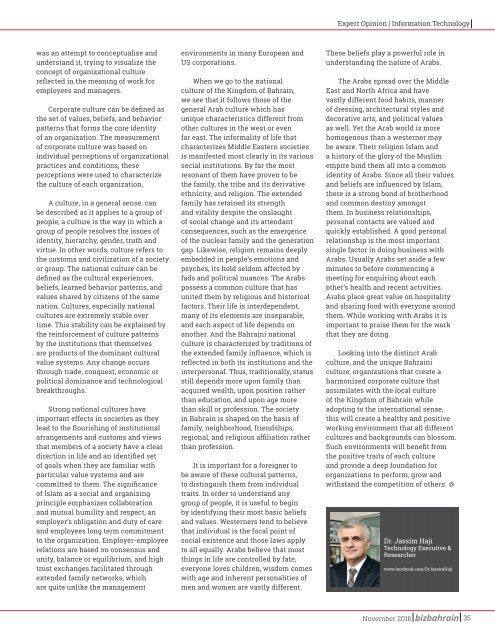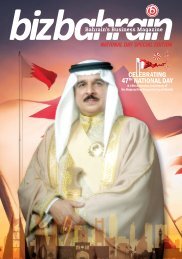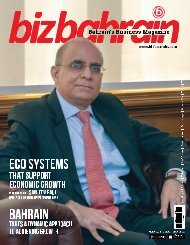BizBahrain November 2016
Create successful ePaper yourself
Turn your PDF publications into a flip-book with our unique Google optimized e-Paper software.
Expert Opinion | Information Technology<br />
was an attempt to conceptualize and<br />
understand it, trying to visualize the<br />
concept of organizational culture<br />
reflected in the meaning of work for<br />
employees and managers.<br />
Corporate culture can be defined as<br />
the set of values, beliefs, and behavior<br />
patterns that forms the core identity<br />
of an organization. The measurement<br />
of corporate culture was based on<br />
individual perceptions of organizational<br />
practices and conditions; these<br />
perceptions were used to characterize<br />
the culture of each organization.<br />
A culture, in a general sense, can<br />
be described as it applies to a group of<br />
people; a culture is the way in which a<br />
group of people resolves the issues of<br />
identity, hierarchy, gender, truth and<br />
virtue. In other words, culture refers to<br />
the customs and civilization of a society<br />
or group. The national culture can be<br />
defined as the cultural experiences,<br />
beliefs, learned behavior patterns, and<br />
values shared by citizens of the same<br />
nation. Cultures, especially national<br />
cultures are extremely stable over<br />
time. This stability can be explained by<br />
the reinforcement of culture patterns<br />
by the institutions that themselves<br />
are products of the dominant cultural<br />
value systems. Any change occurs<br />
through trade, conquest, economic or<br />
political dominance and technological<br />
breakthroughs.<br />
Strong national cultures have<br />
important effects in societies as they<br />
lead to the flourishing of institutional<br />
arrangements and customs and views<br />
that members of a society have a clear<br />
direction in life and an identified set<br />
of goals when they are familiar with<br />
particular value systems and are<br />
committed to them. The significance<br />
of Islam as a social and organizing<br />
principle emphasizes collaboration<br />
and mutual humility and respect, an<br />
employer‘s obligation and duty of care<br />
and employees long term commitment<br />
to the organization. Employer-employee<br />
relations are based on consensus and<br />
unity, balance or equilibrium, and high<br />
trust exchanges facilitated through<br />
extended family networks, which<br />
are quite unlike the management<br />
environments in many European and<br />
US corporations.<br />
When we go to the national<br />
culture of the Kingdom of Bahrain,<br />
we see that it follows those of the<br />
general Arab culture which has<br />
unique characteristics different from<br />
other cultures in the west or even<br />
far east. The informality of life that<br />
characterizes Middle Eastern societies<br />
is manifested most clearly in its various<br />
social institutions. By far the most<br />
resonant of them have proven to be<br />
the family, the tribe and its derivative<br />
ethnicity, and religion. The extended<br />
family has retained its strength<br />
and vitality despite the onslaught<br />
of social change and its attendant<br />
consequences, such as the emergence<br />
of the nuclear family and the generation<br />
gap. Likewise, religion remains deeply<br />
embedded in people’s emotions and<br />
psyches, its hold seldom affected by<br />
fads and political nuances. The Arabs<br />
possess a common culture that has<br />
united them by religious and historical<br />
factors. Their life is interdependent,<br />
many of its elements are inseparable,<br />
and each aspect of life depends on<br />
another. And the Bahraini national<br />
culture is characterized by traditions of<br />
the extended family influence, which is<br />
reflected in both its institutions and the<br />
interpersonal. Thus, traditionally, status<br />
still depends more upon family than<br />
acquired wealth, upon position rather<br />
than education, and upon age more<br />
than skill or profession. The society<br />
in Bahrain is shaped on the basis of<br />
family, neighborhood, friendships,<br />
regional, and religious affiliation rather<br />
than profession.<br />
It is important for a foreigner to<br />
be aware of these cultural patterns,<br />
to distinguish them from individual<br />
traits. In order to understand any<br />
group of people, it is useful to begin<br />
by identifying their most basic beliefs<br />
and values. Westerners tend to believe<br />
that individual is the focal point of<br />
social existence and those laws apply<br />
to all equally. Arabs believe that most<br />
things in life are controlled by fate,<br />
everyone loves children, wisdom comes<br />
with age and inherent personalities of<br />
men and women are vastly different.<br />
These beliefs play a powerful role in<br />
understanding the nature of Arabs.<br />
The Arabs spread over the Middle<br />
East and North Africa and have<br />
vastly different food habits, manner<br />
of dressing, architectural styles and<br />
decorative arts, and political values<br />
as well. Yet the Arab world is more<br />
homogenous than a westerner may<br />
be aware. Their religion Islam and<br />
a history of the glory of the Muslim<br />
empire bind them all into a common<br />
identity of Arabs. Since all their values<br />
and beliefs are influenced by Islam,<br />
there is a strong bond of brotherhood<br />
and common destiny amongst<br />
them. In business relationships,<br />
personal contacts are valued and<br />
quickly established. A good personal<br />
relationship is the most important<br />
single factor in doing business with<br />
Arabs. Usually Arabs set aside a few<br />
minutes to before commencing a<br />
meeting for enquiring about each<br />
other‘s health and recent activities.<br />
Arabs place great value on hospitality<br />
and sharing food with everyone around<br />
them. While working with Arabs it is<br />
important to praise them for the work<br />
that they are doing.<br />
Looking into the distinct Arab<br />
culture, and the unique Bahraini<br />
culture, organizations that create a<br />
harmonized corporate culture that<br />
assimilates with the local culture<br />
of the Kingdom of Bahrain while<br />
adopting to the international sense,<br />
this will create a healthy and positive<br />
working environment that all different<br />
cultures and backgrounds can blossom.<br />
Such environments will benefit from<br />
the positive traits of each culture<br />
and provide a deep foundation for<br />
organizations to perform, grow and<br />
withstand the competition of others.<br />
Dr. Jassim Haji<br />
Technology Executive &<br />
Researcher<br />
www.facebook.com/DrJassimHaji<br />
<strong>November</strong> <strong>2016</strong><br />
35

















